Flexibility and dedication: EAG Boston 2023 talk
Video
Transcript
Historically, effective altruism has really leaned into ways of thinking and doing good in the world that emphasise the value of flexibility– the ability to figure out which opportunities are best, and to switch directions as needed to be more effective.
Cause neutrality – not being married to any particular cause so that you can work on whatever seems most pressing, is paradigmatic here.
But cause prioritization research, including foundational research in ethics, as well as more applied charity evaluation, are all also investments in our ability to find and keep track of what does more good, and switch to that.
But we’re at a point now where distinct fields and projects are gaining momentum. And in particular, AI Safety is developing into its own field, and going somewhat mainstream — so not everyone who gets involved with it will do so through EA. And people who might work in AI safety, or any other particular area, are not necessarily that interested in thinking about cause prioritisation, or philosophical ethics.
A lot of people just want to keep their heads down and stay focused on pushing forward the particular project they’ve chosen because they think it’s important.
So it’s been on some people’s minds what it means for all this to be under one umbrella and whether there’s any tension there.
First I want to say that I don’t think there’s any tension at all in principle between spending practically all your time head down on a particular project and being really into effective altruism.
Because pursuing that project could be what you honestly think matters most.
For example, take orchestrating an effort to secure seed banks to grow food for everyone in case of an agricultural disaster. You might think just working on that is what you can do that matters most because the stakes are high and maybe you’re in a great position to contribute.
And I think that is what’s at the heart of EA: trying to pay a lot of attention to what you honestly think matters most.
I think a lot of the other core values of EA basically stem from this.
I won’t talk about all of these [examples on the slide 3], but I think incessantly asking ‘what really matters most here?’ has been behind many of the signature values and ideas of effective altruism.
Take scout mindset – this is the attempt to stay curious and open minded and to try to really figure out what’s true, rather than fight for a particular position.
The reason people value this, I think, is that they find that when they think about it, they don’t think having been right this whole time in whatever argument they’ve recently been having matters particularly much much compared to actually understanding the world better in ways that allow them to act better within it.
Or think about unconventional ideas like earning to give: this comes from that noticing that how much good work gets done is what matters most—much more than who exactly makes it happen with their own two hands.
And being attentive to what matters most also means being realistic about outcomes instead of overly optimistic about what we can get done, since what happens as a result of what we do matters more than what we hoped or intended.
This means prioritizing – between causes, interventions, jobs, and projects – all the way down until it’s more trouble than it’s worth.
Because you’re not going to be able to do everything, not even everything that’s good, not even everything that’s important.
And I think you can tell a similar story about the role of really paying attention to what matters for many other important ideas, like radical empathy, and scope sensitivity.
But some ways of really trying to pay attention to what matters though look and feel pretty different from one another.
In particular, some ways look like investing in flexibility, and others look more like what I’m going to call ‘dedication’.
I already mentioned the idea of flexibility and how central it is in effective altruism. Here I’ll just add one more illustrative example:
I think encouraging criticism of EA ideas, as in last year’s EA criticisms contest, is partly an investment in flexibility – ideally it helps us see where we’re wrong and change focus and encourages a culture of questioning and holding onto ideas lightly, and being willing to change our minds.
On the other hand, another really natural thing to do when you’re paying close attention to what you think matters most is to zoom in on the area that you think is most pressing, or where you think you can make the biggest difference, and do what you can to push progress forward there.
I’m going to call this dedication, which I think is an imperfect word for it, because it sounds like a virtue, and I don’t think the opposite is exactly a vice.
But I’m trying to get at the idea of taking steps to get more done efficiently, even if it means making commitments that make you less able to change what you’re doing later, or requires a focus on execution within a narrower band of options – rather than always being open to re-examining your assumptions and the broader strategic situation. This can allow you to bring more focus and ultimately more power to accomplish what you’re trying to do.
For example, building a complex organisation to work on a particular intervention—like this example of securing seed banks in case of an agricultural disaster—might mean dedicating years to a multi-stage plan and hiring a specialised staff, both of which limit your flexibility. But it means you can really build something – and that you stand a better chance of actually putting this form of global insurance in place at a large scale.
One thing I want to make clear: dedication doesn’t always involve making explicit commitments. It includes specialisation, scaling up initiatives, or just deciding not to open up some questions. Anything that makes it de facto harder to change direction, in exchange for making something happen more powerfully or more efficiently, is an instance of this value.
So we can see the value of both flexibility and dedication, but they trade off against one another. This happens in all kinds of places.
Take hiring. In my own case I have to think about whether to hire specialist writers, with a deep background in a subject, or generalist ones, who can dive into a lot of of topics but aren’t really experts on anything. Specialists might allow us to produce kinds of work that a team of generalists just can’t; but if our plans change, or we lose capacity somewhere else in the team, a generalist will be more able and willing to jump in and fill the gap.
The tradeoff also comes up in your career. Skilling up in something like management or communications gives you flexibility because they’re useful in a lot of contexts. On the other hand, imagine you could know ahead of time that a niche speciality – say, resilient crop genetics, would end up being crucial in the future. Then getting a PhD in that would plausibly be the most powerful thing you could do to have a positive impact.
Okay and this one I’m less sure about (but that also means it might be more interesting) – I suspect that a dedication-flexibility tradeoff is also part of what’s going on with people’s unease around deference. Deferring to someone else allows you to form beliefs a lot faster than you could otherwise, so you can get down to the business of execution. Done right it’s efficient, and high leverage, but it’s a soft form of commitment. If a lot of people are deferring in a group, it makes them less flexible, because they’re not equipped to figure out whether we should change things.
Imagine, as exaggerated example, that only one person in EA ever looked into what the world was like and what we should do, and everyone else just listened to them, and executed on their vision. Their work be very high leverage, and as a group, we’d get a lot done. But we’d have invested very little in developing the ability to notice where we’re going wrong and to do something different.
Finally, I think we face this trade-off in how much to do effective altruism movement building vs. focusing on building specific fields. EA’s emphasis on equipping people to figure out what they think matters most and switch to that makes it an investment in flexibility. And it’s really valuable that people in this community will change what they do based on new evidence.
But building particular fields could be higher leverage and more efficient: not everyone who can contribute is as interested as your average EA is in cause prioritisation, or questioning foundational assumptions; and these things do require time and energy. So cause-specific groups might be able pull in more people and spend more time on execution.
I said finally just now, but I actually just think this trade-off is at play in a lot of decisions and disagreements—both in EA and in everyday life [examples on slide 8].
So how can we navigate it?
I think the first thing to do is just notice it’s there. Both flexibility and dedication have value. So if you’re finding yourself sacrificing some of one for the other and feeling bad about it – that might just be OK because it might just be necessary. Others, of course, are having to do the same thing – and I think seeing people as making this tradeoff differently is one way of making sense of some disagreements.
Second, probably don’t go too extreme in either direction.
Imagine if we only ever went for flexibility as a community – we’d learn a lot, and rarely need to backpedal, but we probably wouldn’t get much done in the world, because concrete, on-the-ground projects usually involve some level of investment that can’t easily be converted into something else.
Flexibility is useful because it allows us to take better opportunities. It’s not useful if we never take any of those opportunities.
But totally neglecting flexibility is also a mistake, for reasons that are probably familiar to this crowd. The truth is that how to do a lot of good is very non-obvious – not only is there lots of uncertainty, the landscape also changes with time, so it really matters to be able to adapt.
We can also make some moves toward dedication – like doing cause-specific field-building – while keeping some of the emphasis on flexibility EA has traditionally had. Even if you strategically close some questions for a while, you can still encourage a culture of open-mindedness and celebrate it when people switch to something else when they think it will do more good.
Third, try to keep track of where you’re most uncertain and invest in flexibility there. The less confident you are, the more value there is in flexibility because the more likely it is you will want to change plans as you learn more.
And you might be happy to be dedicated in some areas and not others. For example, maybe you’re pretty confident in the career strategy of becoming a world-class software engineer, so you’re happy to just keep building those skills. But you aren’t sure where to work to do the most good – so you might try to develop lots of connections and information flows, to make you more flexible about where you work, even if you’re dedicated to what you do.
Fourth, as a community we can to some extent take a portfolio approach – having some people pursue high-leverage projects that require dedication, while having others work on helping us stay more flexible by keeping tabs on different fields, comparing ideas for impact, and publicizing great opportunities as they come up.
Fifth, and this looks like a bit of a win-win (which is sort of suspicious in a context like this) – having lots of connections with different fields seems helpful for both flexibility and dedication.
By this I mean being part of multiple communities yourself – EA but also biosecurity, or AI safety, or the startup community, or the diplomacy community. Or just building relationships across these groups.
In general, sharing resources and ideas with people with different points of view builds flexibility, for the same reason the EA criticism contest does. It helps you see when and how to change your mind.
But it also seems helpful for being able to build projects that require specialisation or other forms of dedication – because much of the specialised knowledge out there exists in these other fields, as do many people who can add their talents to dedicated projects.
Finally, I think staying attentive to what most matters also pays off here.
As I said we’re at this moment where lots of people are pursuing high-dedication paths in specific cause areas. This is really valuable.
But I think that continuing to pay a lot of attention to what matters most – even as you make those kinds of investments – can be a form of flexibility of its own.
Because really caring what matters makes you more likely to notice if a time does come along that you do need to unwind and change what you’re doing, despite the investments you’ve made. It makes you more willing to pay high costs of switching when it’s important; freeing you up to dedicate yourself your best guess in the meantime.
Thanks for listening. Have a great conference!
Slides

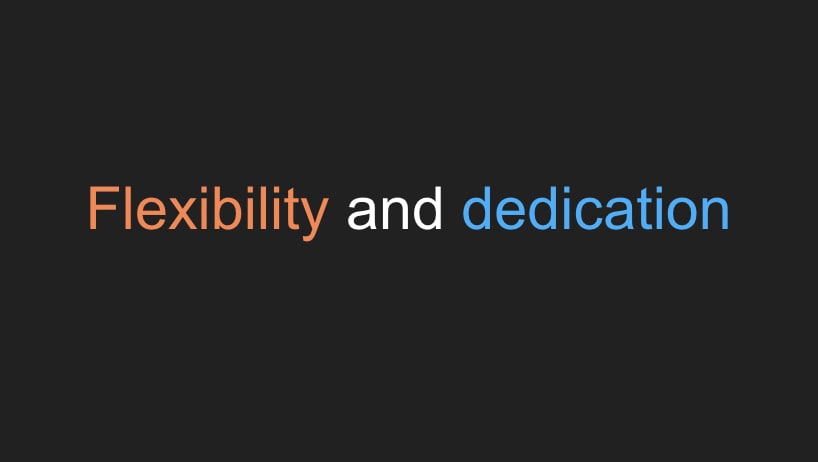
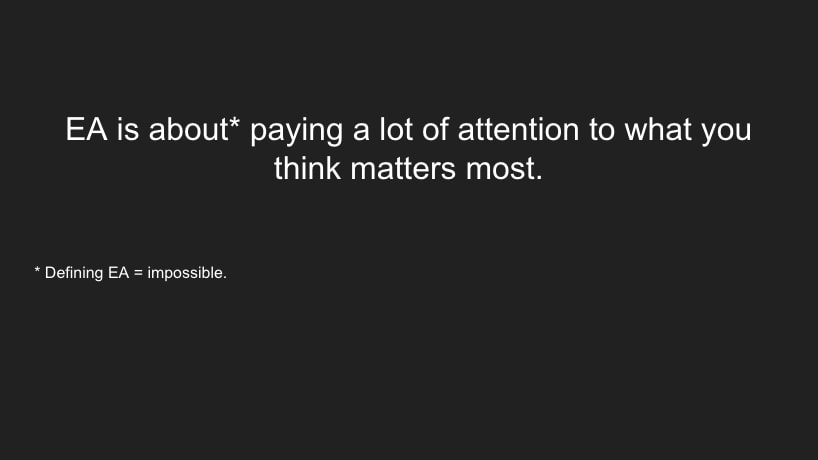
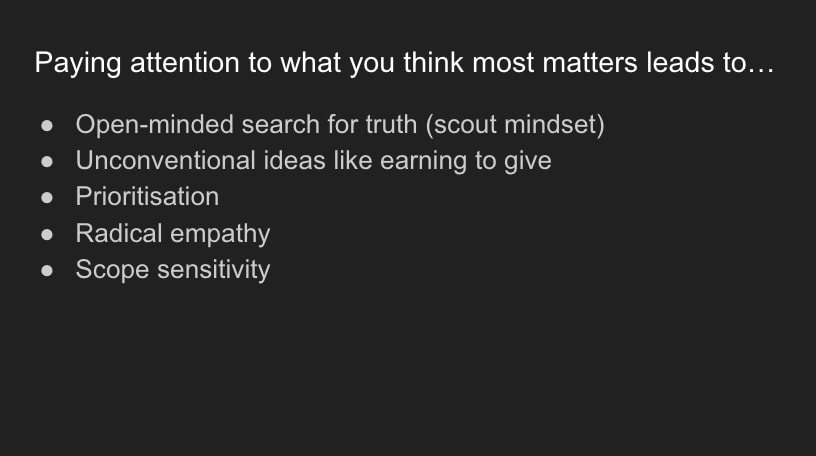
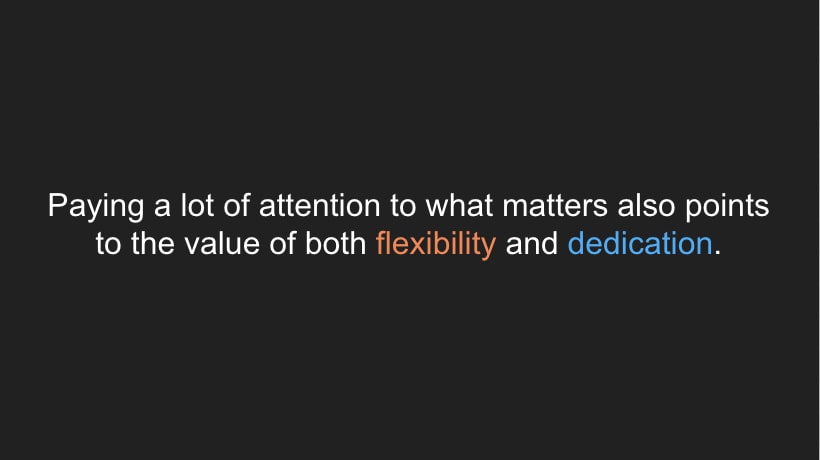
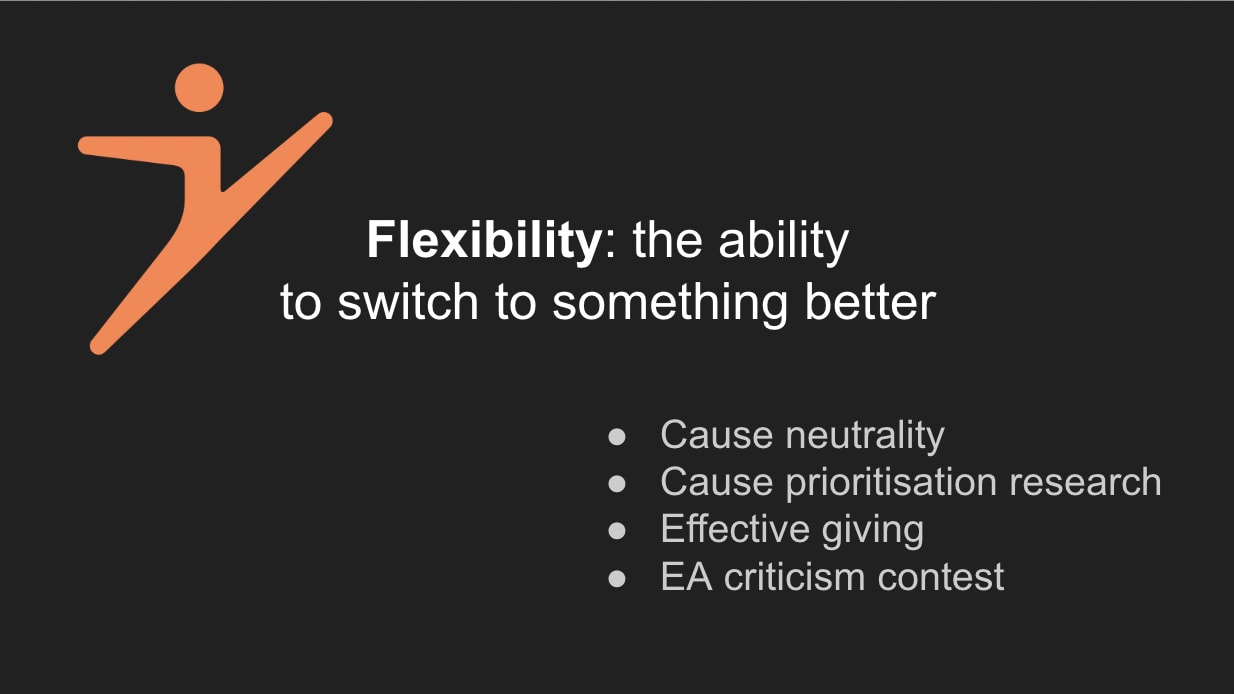
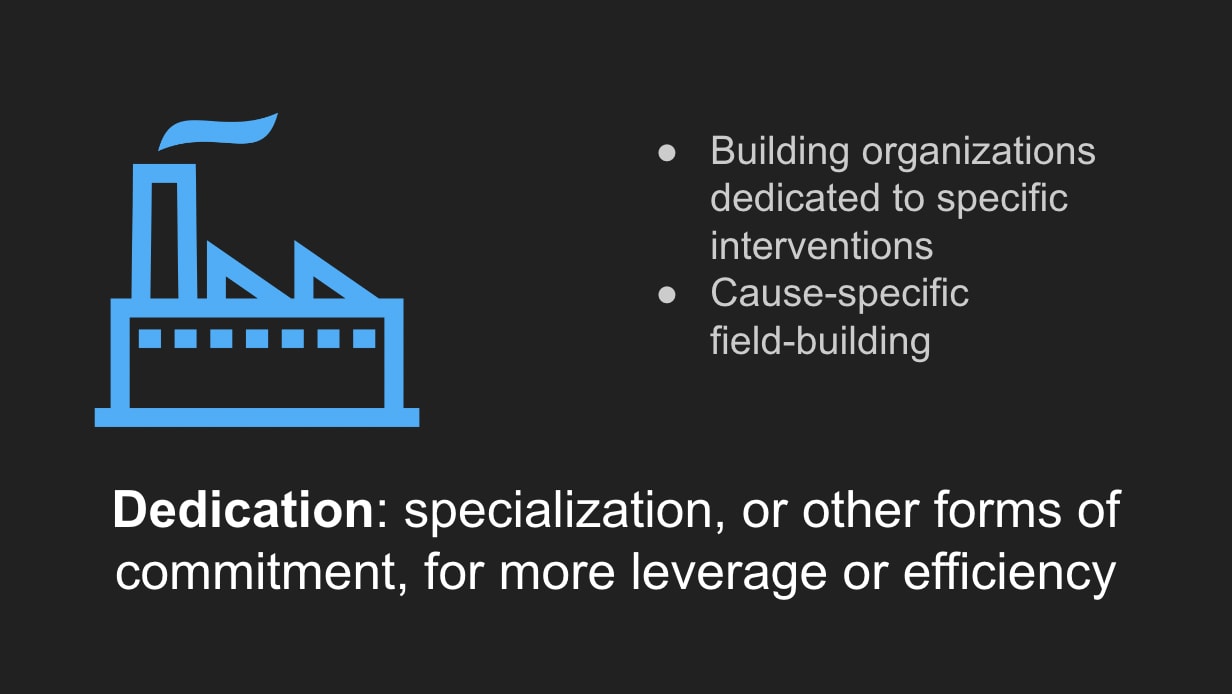
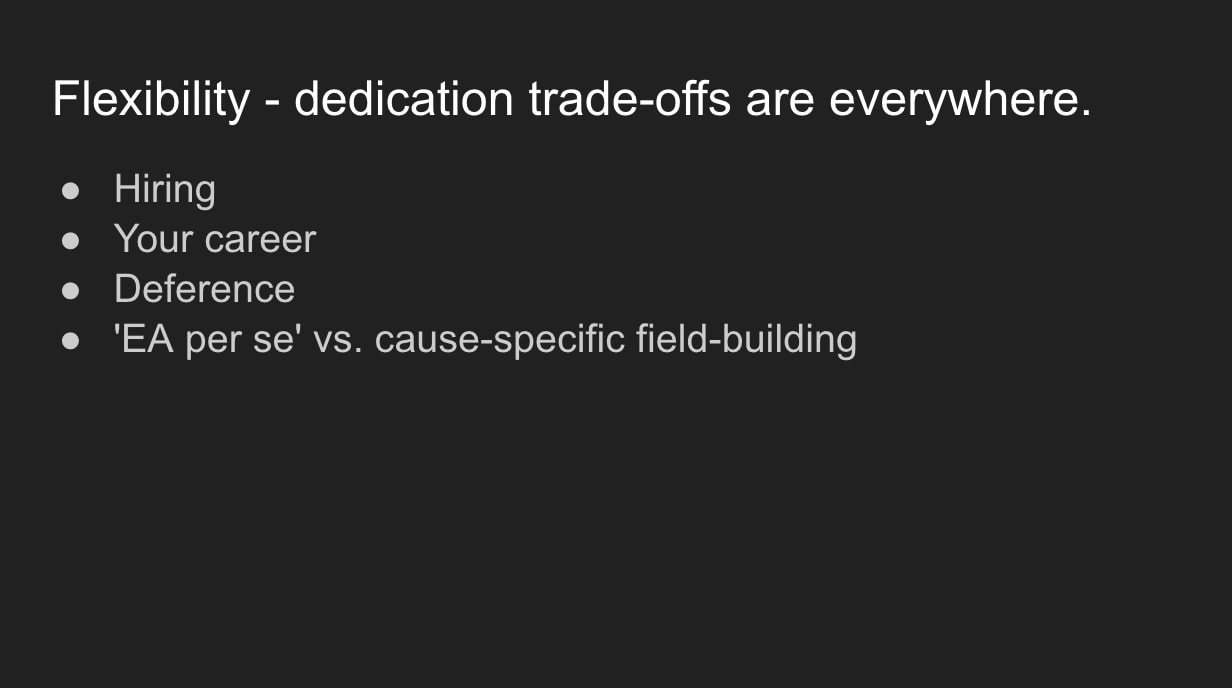
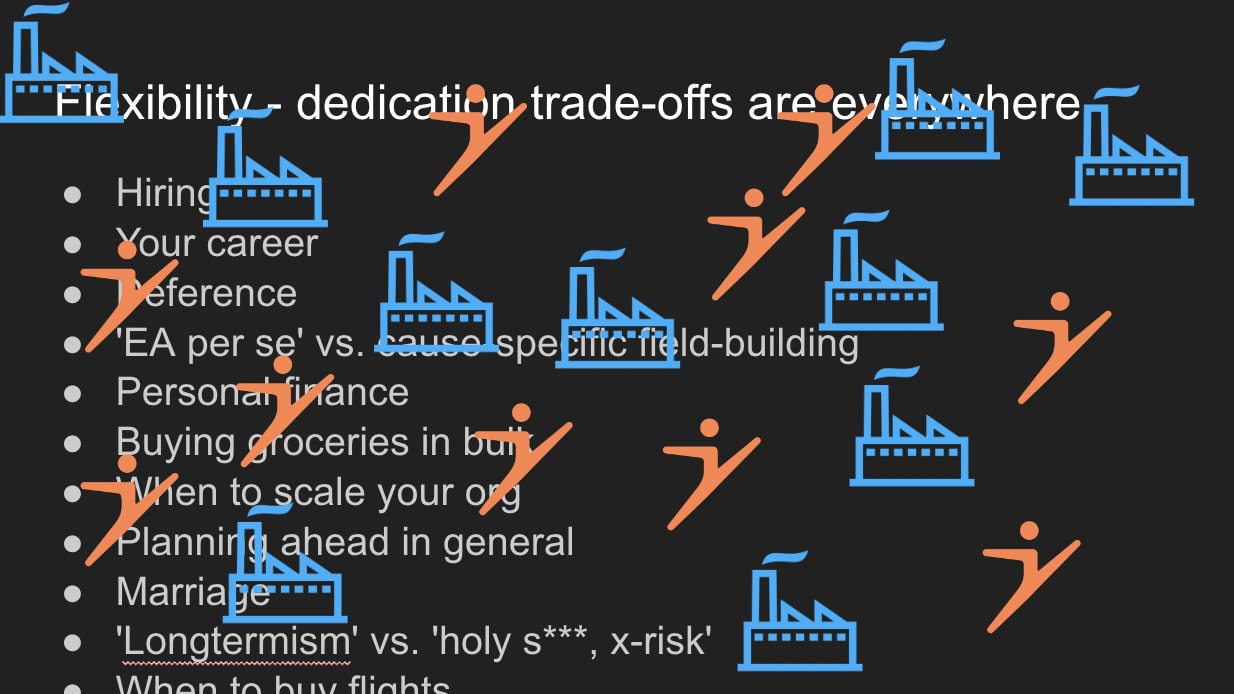
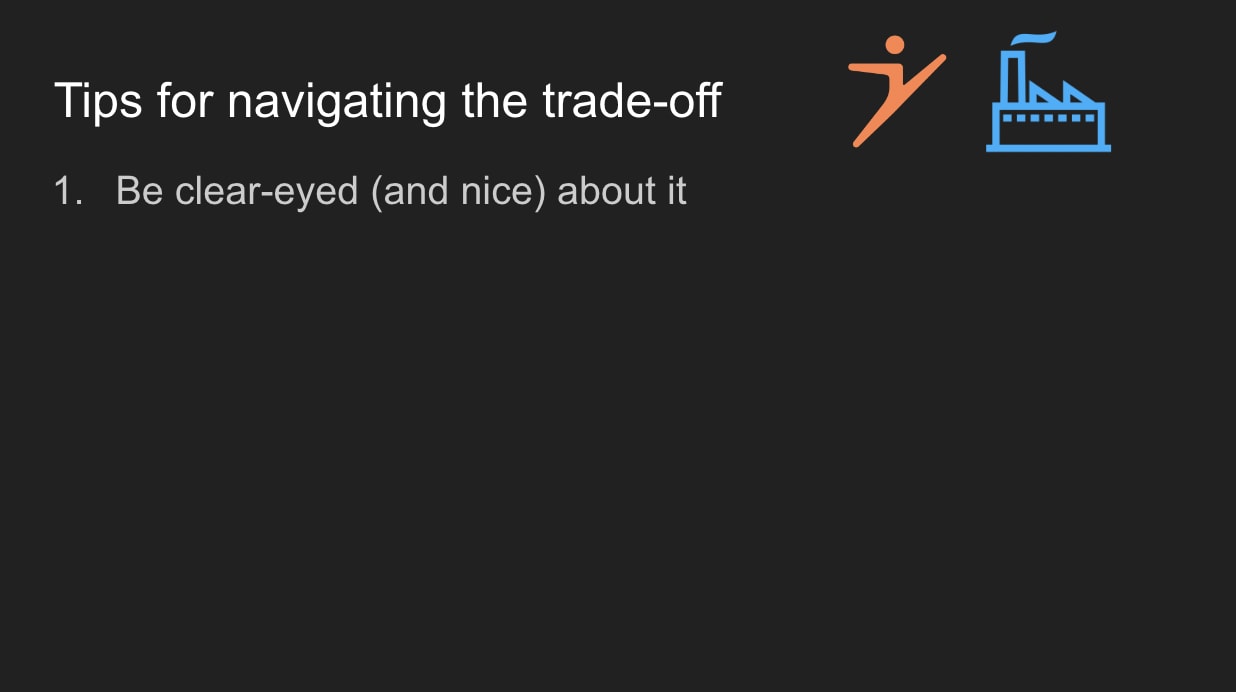
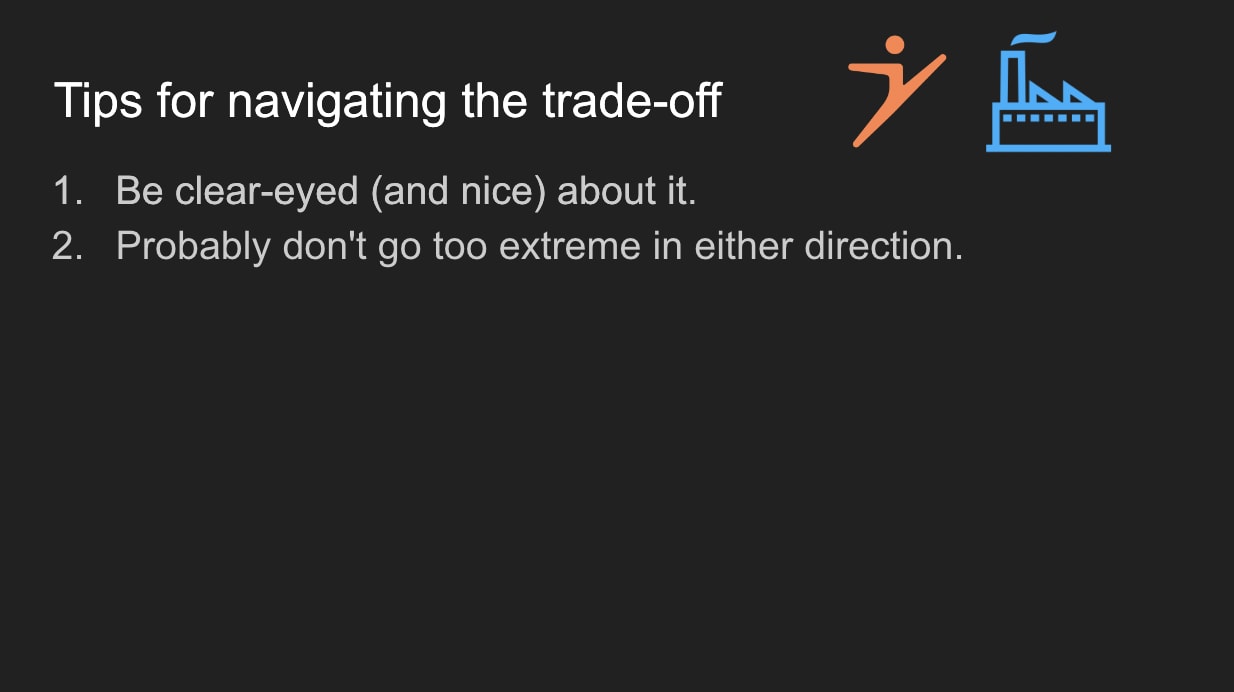
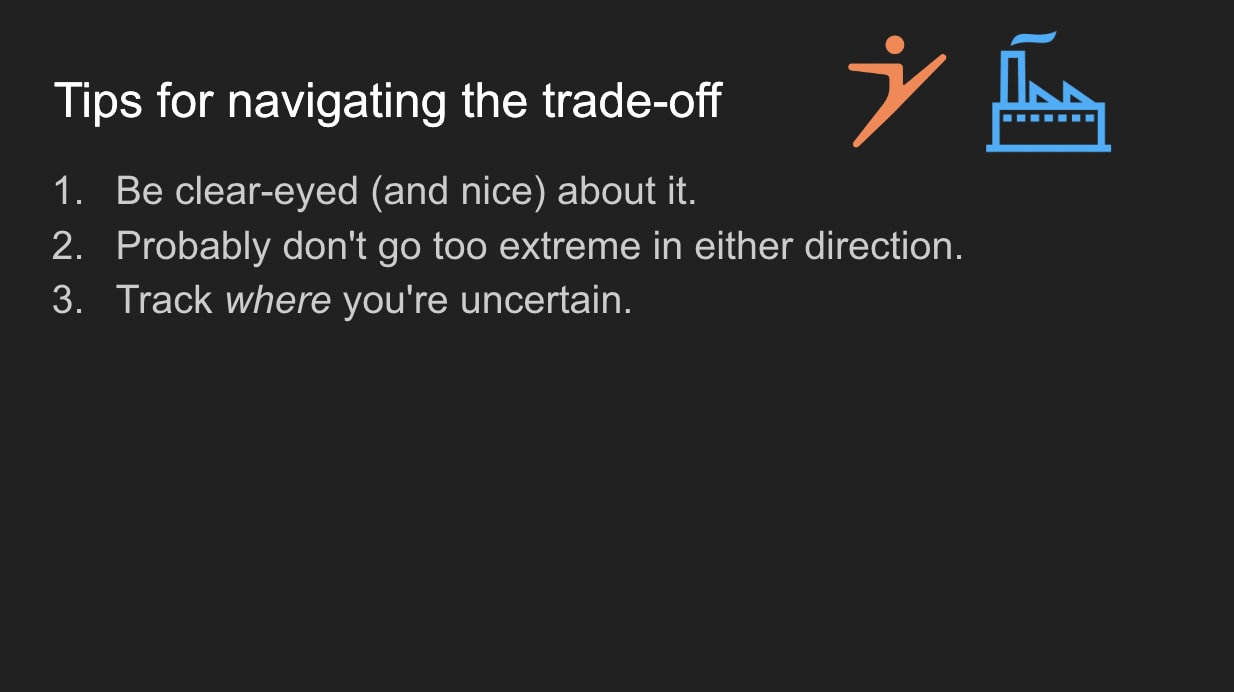
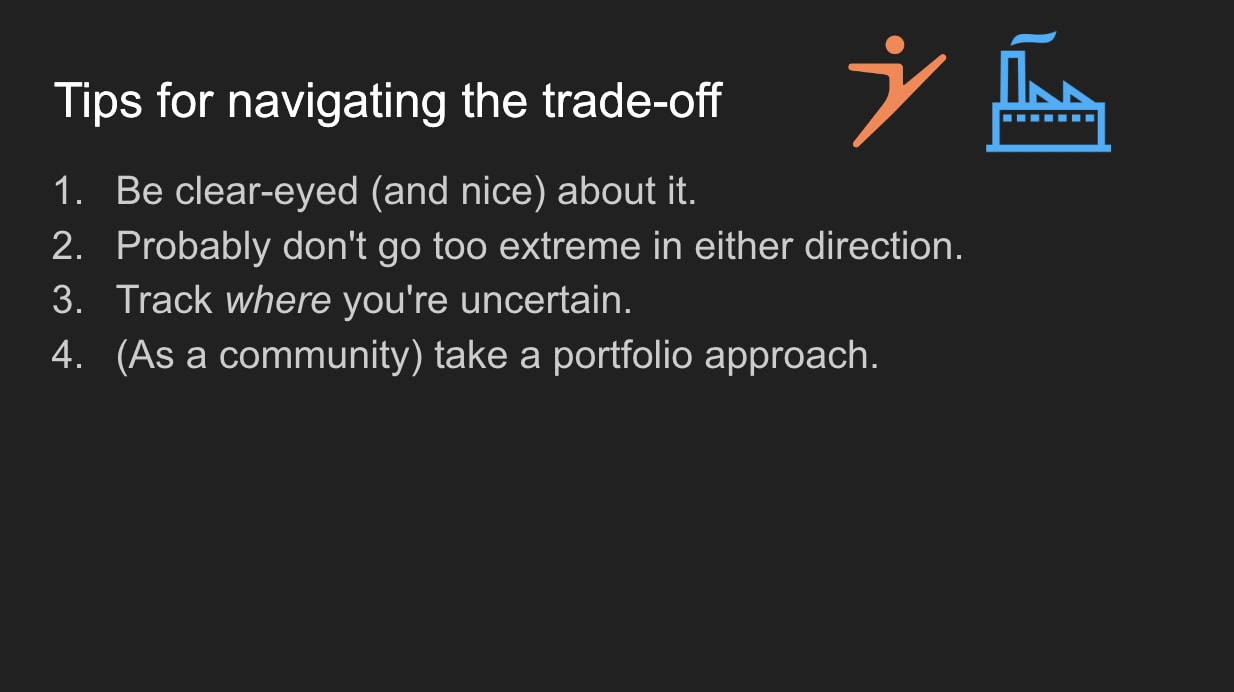
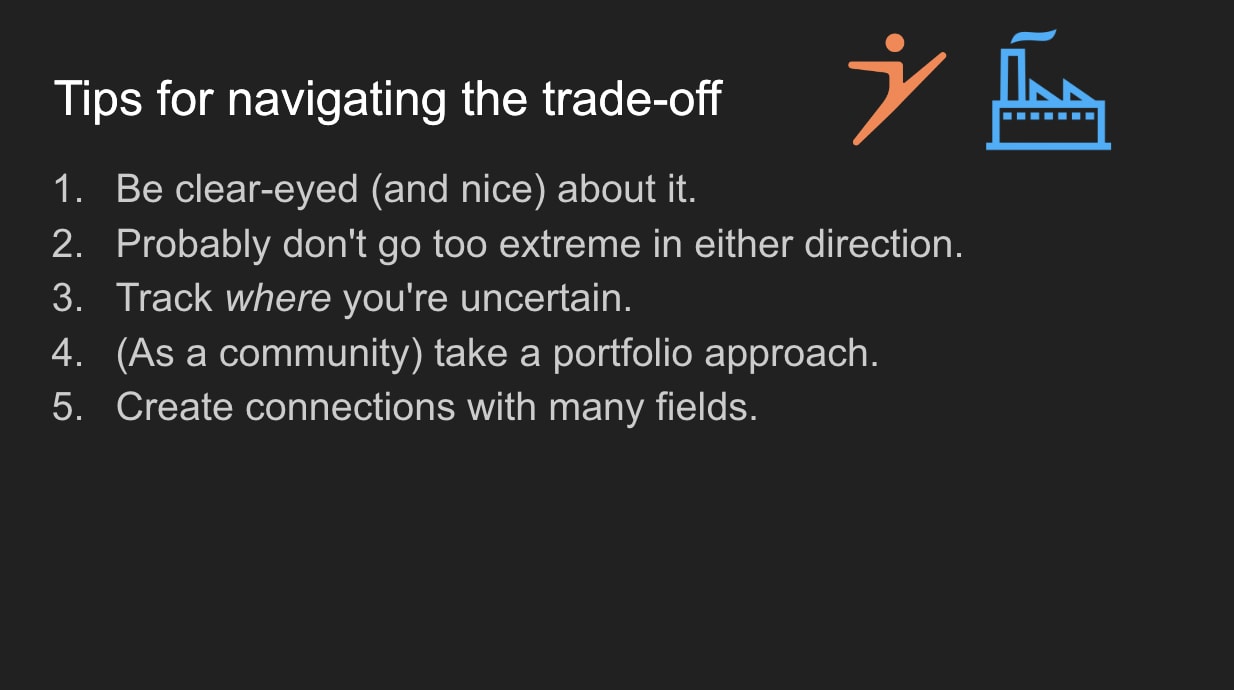
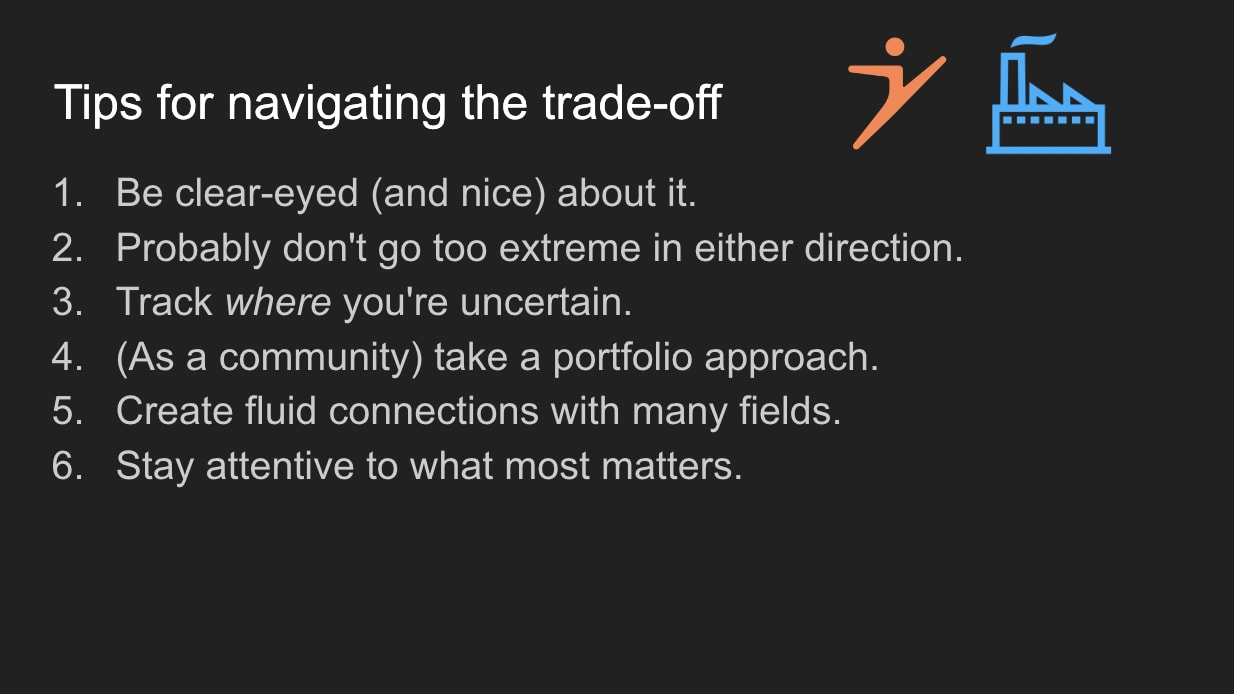
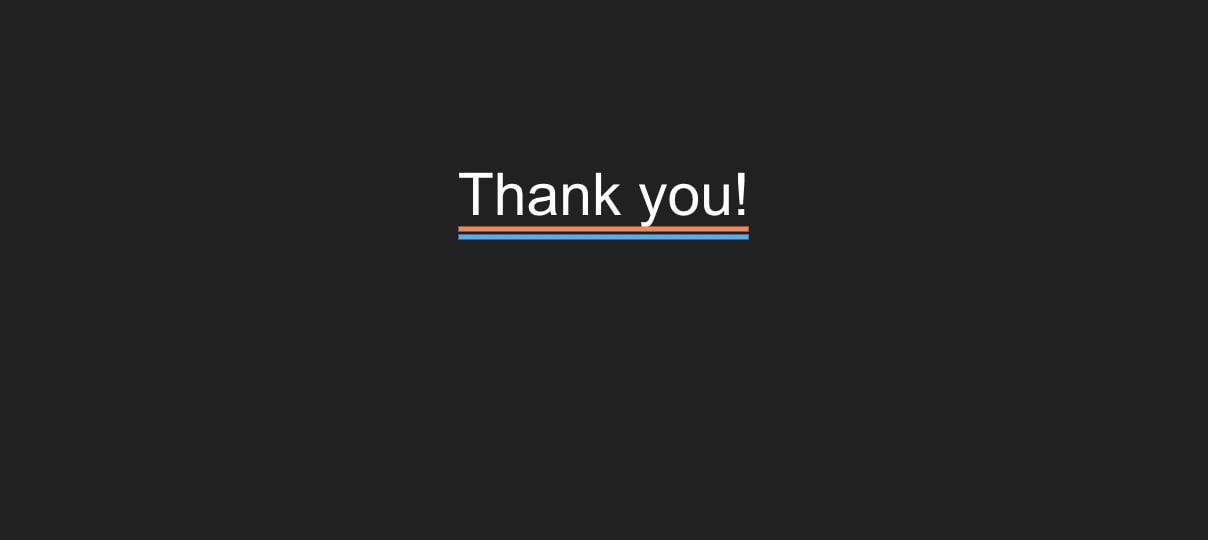
I think it would be really useful for someone with a mathematical background to develop this further. The flexibility/dedication tradeoff seems about the same as the explore/exploit tradeoff, which I understand to have been studied a fair amount. I’d imagine there’s a lot of theory that could be applied and would allow us to make better decisions as a community, especially now that lots of people are thinking about specializing or funding specialization. I bet we could avoid significant mistakes at a low cost by quantifying investments in each area and comparing them to theoretical ideals.
Executive summary: Effective altruism involves balancing flexibility to pursue the most impactful opportunities with dedication to efficiently execute on commitments in areas one believes are highly valuable.
Key points:
Flexibility allows adjusting plans when new evidence arises, but risks failing to accomplish substantive projects.
Dedication drives efficient execution but limits ability to change course. Tradeoffs exist in hiring, careers, deference, and movement building.
Extremes are unwise; uncertainty merits flexibility; connections across groups aid both.
A portfolio approach takes advantage of different styles while staying attentive to what matters most.
Focusing on what matters can provide flexibility despite dedicated investments.
This comment was auto-generated by the EA Forum Team. Feel free to point out issues with this summary by replying to the comment, and contact us if you have feedback.